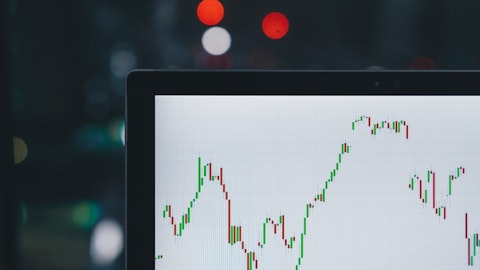Damian Kozlowski: Yes. To be honest, that’s giving us a little bit more time. We’re not that patient, to be honest. If you think of us only as a bank, you’re going to miss the story. If you look just at this quarter, our efficiency ratio was 38% and we still have $3 billion of balance sheet to deploy building our business. So the ROE, it’s not really a bank ROE in a lot of ways. It’s a services and distribution I think we can get there sooner. I think the ramp time to Mike’s point before is going to be a couple of years to get a meaningful part. By that time, our balance sheet will be filled up. But I can see that happening within the next 3 to 5 years to get there. And then it’s — we could be even better by 2030. Now would I be happy in 2030 to have those numbers which bank — what other banker in the world win it.
So we’re very conservative. As you know, we’re very rigorous. We think we’ve got some real niches and opportunities out there to build but we’re realistic. We know we need management time, we need investment and we need patience. So yes, 2030, we’d be incredibly happy for that to happen but I think we can do it sooner.
Frank Schiraldi: Okay. And then just thinking about, again, the balance sheet staying below $10 billion. And so no need for additional capital. I guess the next question is, when you get to those numbers, I mean, what do you do with all that capital? It seems like you’re going to run out of shares to buy. Is it special dividends that you look at? I mean, any sort of thoughts on when you’re generating that sort of capital and the balance sheet isn’t growing.
Damian Kozlowski: It’s not our money. As you know, our perspective, we’re shareholder advocates. It’s not our money. We’re borrowing it from our shareholders. It’s their money. We — with economically advantaged to our investors at our current PE to return it through buybacks. When the stock gets adequately valued considering high multiple for high-performing banks plus a premium on our fee activities in the fintech world, then we will return it if the stock is fairly valued or overvalued, we will return it into a big dividends. We’ll just simply give it back. We’re not going to. We’ve talked about this before. We’re not looking to build a big institution that is not high performance or doing acquisitions that aren’t accretive.
We may do acquisitions but they’ll be smaller and they’ll be accretive. So that’s our mentality. We want to be very rigorous in doing that and we just — I’ll take the opportunity to thank all the shareholders for temporarily using their money and I promised to return it.
Frank Schiraldi: Okay, fair enough. And then on just the GDV, just going back to the nearer term ’24, in terms of GDV, is that — sorry if I missed but is that something you’re still expecting to outstrip historic levels. So still which, I guess, would be 15% plus — is that still a reasonable expectation?
Damian Kozlowski: Yes, for the full year. So as you know, it bounces around. But I think 15-plus looks very doable. And we think we’re going to see higher fee growth than we have, that — the difference between GDV and fee growth. We saw it in the fourth quarter, 15% with 13% and that’s because we’re getting other services like in that ACH line and push-to-card line, we’ll see higher growth this year. So on an aggregate basis, we could see extremely good. Instead of the 9%, 10%, 11% — we could see more like 12%, 13%, 14% fee growth; so excited about those lines to it. And as you know, we’ve got great visibility and we’ve been adding partners and we’ll make announcements. And there’s been a lot of regulatory pressure within the banking as a service space, something that we’ve avoided by making all the investments we did over the last 5 years.
So we’ve got a great position. We’ve got a very broad rigorous ecosystem. We have a majority of the large players in the industry. And all those things work together there in order to add increasing amount of volumes from larger players that are established and are now working with other banks.
Frank Schiraldi: And then additionally, on fees, maybe I misread something in the release but I thought you also had some — you talked about moving deposits and loans off balance sheet over time to stay under that $10 billion. I thought I read that you had $300 million in deposits off balance sheet at end of period. Is that right? And are those generating fees?
Damian Kozlowski: Those are not — we’ve moved those off with our partner. So those were higher cost deposits. So those are not generating fees. They would actually cost us money to have on the balance sheet because they’re savings like deposits. So we — when we — as you know, we have a lot of liquidity right now in order to buy bonds. So, we don’t want to — this is more of a management tenant rather than maybe it’s not totally economic at all times but we try to match appropriately assets and liabilities and liquidity. We always are very liquid. So we do not want to keep a lot of excess deposits on the balance sheet if they’re not necessary. So we try to match those. Sometimes there might be a little economic negative to it. But long term, we believe. And rigorous fiscal management and the matching of assets and liabilities as a general tenet of managing the bank?




